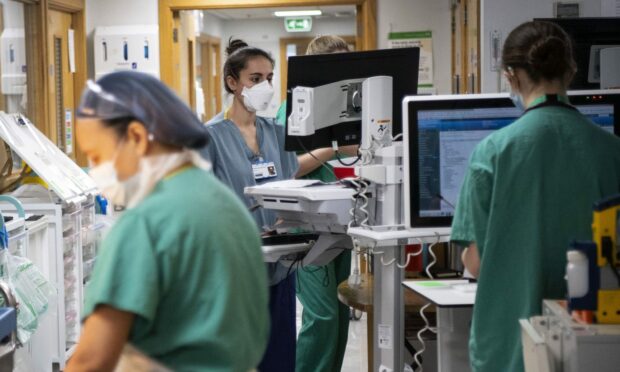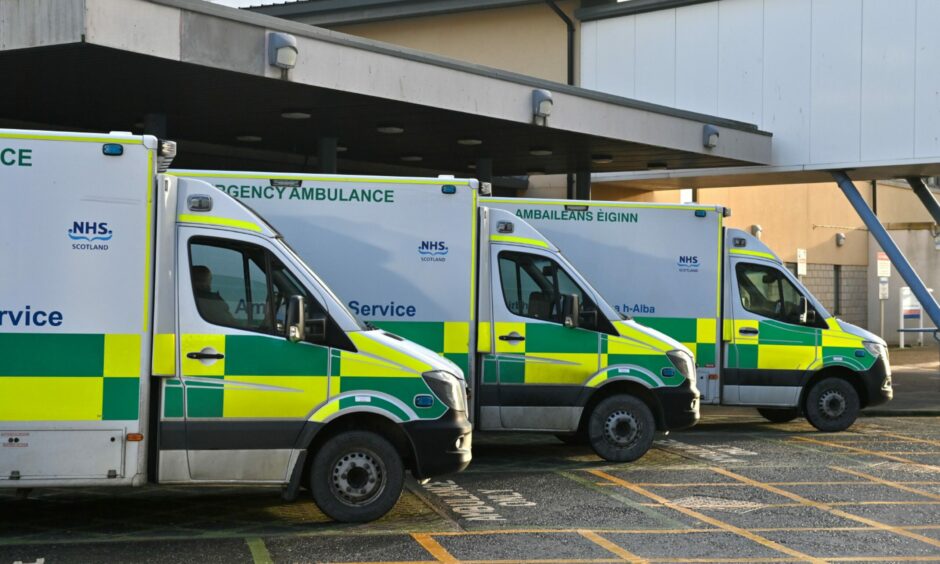NHS Grampian has said it is nearing hospital bed capacity, and in some places going above it as the service continues to fight one of the biggest crises it has seen.
The health board says it is assessing patients needs and prioritising those who are at risk of dying.
Jillian Evans, NHS Grampian’s head of health intelligence, has advised people to look at all pathways to healthcare – but said the last thing the board wanted to do was put off people seeking the care they needed.
It comes as delayed discharge statistics reach a record high for the third month in a row.
Meanwhile, NHS Highland is focussing on moving patients who are less ill from Raigmore in Inverness to smaller facilities to free up hospital beds.
‘Extreme levels of pressure’
NHS Grampian has said a large number of patients arriving at hospitals combined with those unable to be discharged is causing the issues.
A spokesman said: “Our used hospital bed capacity remains very high, with some areas at, near, or above 100%.
“We continue to experience an extreme level of pressure across our health care system.
“This is due to the number of acutely ill patients arriving at hospital and difficulties in discharging patients to community settings.
“We are seeing an increase in the number of patients presenting with influenza, Covid-19 and other respiratory illnesses, who require hospital treatment as a result. The high levels of these viruses circulating in communities is also affecting our staffing levels.
“At all times, cases are triaged, with those facing life-threatening situations being seen rapidly for life-saving treatment, as an absolute priority.”
Yesterday, First Minister Nicola Sturgeon made a statement to the public urging people to get the care they need by accessing services such as NHS Inform, community pharmacies and NHS24, rather than accessing hospital services first.
She said NHS hospitals were facing unprecedented pressure. You can track A&E waiting times using The Press & Journal’s own tracker here.
An issue of ‘flow’
Jillian Evans head of health intelligence at NHS Grampian told BBC Radio Scotland’s Good Morning Scotland programme this morning the pressure was coming from patients who were unable to be discharged from hospital.
She said: “If you look starkly at the numbers, ie the numbers of the people who have been cared for or treated in accident and emergency departments, those numbers are not higher than they have been in the last four years.
“We are not seeing a surge in demand for care in the accident and emergency department. Where we see the pressure is in finding beds for patients in the rest of the hospital and that, as we know, has a knock on effect everywhere in the system
“It is an issue of flow, that is not to take away from the fact that patients are sicker now than we have been seeing in the past.
Do you know where to get the right care, in the right place? Use this guide to find the care you need quickly, safely and as close to home as possible ⤵️https://t.co/HQbkZlSnwj#RightCareRightPlace pic.twitter.com/Sm1K94RMwS
— NHS Grampian (@NHSGrampian) December 31, 2022
“So, typically we are seeing sicker patients needing to be seen in hospital who are staying longer because they have multiple conditions.”
The issues are believed to be due, in part, to patients staying away from medical care during Covid, partially due to those with respiratory conditions and the ageing population of Scotland.
The number of hospital beds occupied by people who were ready to be discharged has reached a record high for the third month in a row.
Latest figures from Public Health Scotland showed the average number of beds being used by people who were awaiting a care package to leave hospital was 1,950 in November 2022.
It is now the highest figure since the current guidance came into place in July 2016 – up by 3% from October when the daily average was 1,898.
What is the situation in the Highlands?
NHS Highland which operates the largest geographical health board in Scotland has confirmed “pressure remains high” in hospitals, especially at Raigmore in Inverness.
As the largest hospital in the Highlands, it is under pressure and so to prevent the situation escalating further, patients who are less ill are being moved to smaller facilities.
A NHS Highland spokeswoman said: “Pressure remains high across services and we are continuing to take measures to reduce this.
“These include opening additional hospital beds, early discharge if appropriate, and transferring less acutely unwell patients to community hospitals outside of the Inverness area.
“We are also appealing to families and loved ones of patients who are able to be discharged to provide support in the interim whilst care arrangements are being established.
“We recognise this is a big ask, especially at this time of year, but it will help ensure we are able to provide lifesaving care by helping to improve flow through our hospitals whilst the health and social care system is facing significant pressure.”
What action is being taken by the government?
- Additional NHS 24 staff were recruited in the run up to Christmas
- £600m extra funding for the health service was announced in October
- The draft budget for the next financial year will include an increase of £1b in health revenue
- More cash for health and social care partnerships – more details will be shared in today.


Conversation